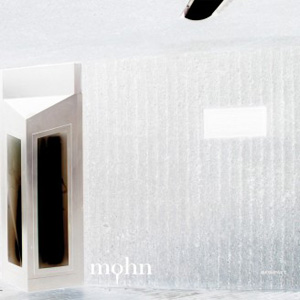Mohn Mohn
A major legacy issue that has haunted techno from its inception is the music’s built-in […]

A major legacy issue that has haunted techno from its inception is the music’s built-in disposability. If you get lucky and produce a smoking club track today, who cares if the buzz wears off tomorrow? But what if your discography is pages thick and goes back decades; your talent so rich that it touches (if not outright creates) several electronic music styles while your project names multiply? And yet, your legacy remains in question, as new waves of whiz kids are unsure of who you are or what you’ve done—even if the current beats they crave are a direct result of your innovation. After more than 20 years of trailblazing, Wolfgang Voigt and his frequent collaborator, Jörg Burger, are in that incredible historical position.
Will the next generation of ravers trainspot a track by Voigt monikers Mike Ink or Love Inc. or M:I:5 from the early 1990s? As time goes on, it appears less and less likely. For those that love to zone out to ambient, are all the installments of Voigt’s Gas series, from 1996 to 2000, considered essential listening? Perhaps not. As for Burger, few artists have worked harder at their craft, though he’s more likely to be celebrated for his work as the Modernist (with releases on Kompakt, Harvest, and Wonder) or the Bionaut, whose “Everybody’s Kissing Everyone” was an acid house love anthem without peer in 1992.
With all this uncertainty, a simple course of action has emerged: stay in the present, keep innovating, and keep producing. Voigt and Burger have taken these ideas to heart for their new project, Mohn, and its self-titled, full-length debut. It’s made up of nine tracks that run the stylistic gamut of what might be expected from this duo, whose 1996 collab, Las Vegas, contained cheeky references to Roxy Music (“Avalon,” “Flesh & Bleed,” “Do the Strand,” “Love Is the Drug”) while pushing a sonic agenda of pop techno and minimal house.
That said, Mohn is not a cheeky effort, nor is it pop or minimal. There is a thread of grim business that runs from the opening “Einrauschen” to the closing “Wiegenlied” that reaches back to the dark, modern-classical vibe found on the Gas records. The tunes that bookend the LP are filled with ominous fuzztones, bass drones that rise and fall, and snare drum bursts drenched in echo and reverb. It sounds almost hauntological, as does track two, “Schwarzer Schwan.”
A slight shift in mood comes with the dubby, gothic, and near-regal “Ambientot,” which revisits a time before the Kompakt empire (which Voigt co-founded and still rules) held sway over the global techno scene. For the sake of establishing some anchors to the question of legacy, let’s say the era mined here is roughly 2001-2002. “Saturn,” on the other hand, rediscovers an even richer vein: the sublime 4/4 roar of 1970s Krautrock and bands like Can, Neu!, and Harmonia, before “Seqtor 88” takes a deeper dive into dub techno. It has less of the grimey, subterranean feel of similar styles unearthed in Detroit and Berlin, and more of the shimmery, cosmic air of Cologne’s sound DNA. This is not at all a bad thing. In fact, it’s elegant, lovely and alluringly danceable.
The hard stuff comes on “Das Feld,” which twists, rolls, and hisses through similar terrain that hosted the Gas experiments or even Burger’s ambient alter ego, Triola. It travels close to the ground, the bassline crackling and fizzing, pulling it downward; at the same time, it pushes toward the sky, heading for the stars. It has exquisite tension. The track clocks in at six minutes, but begs to be longer. You’d love to spend as much time with its seething beauty as you can.

